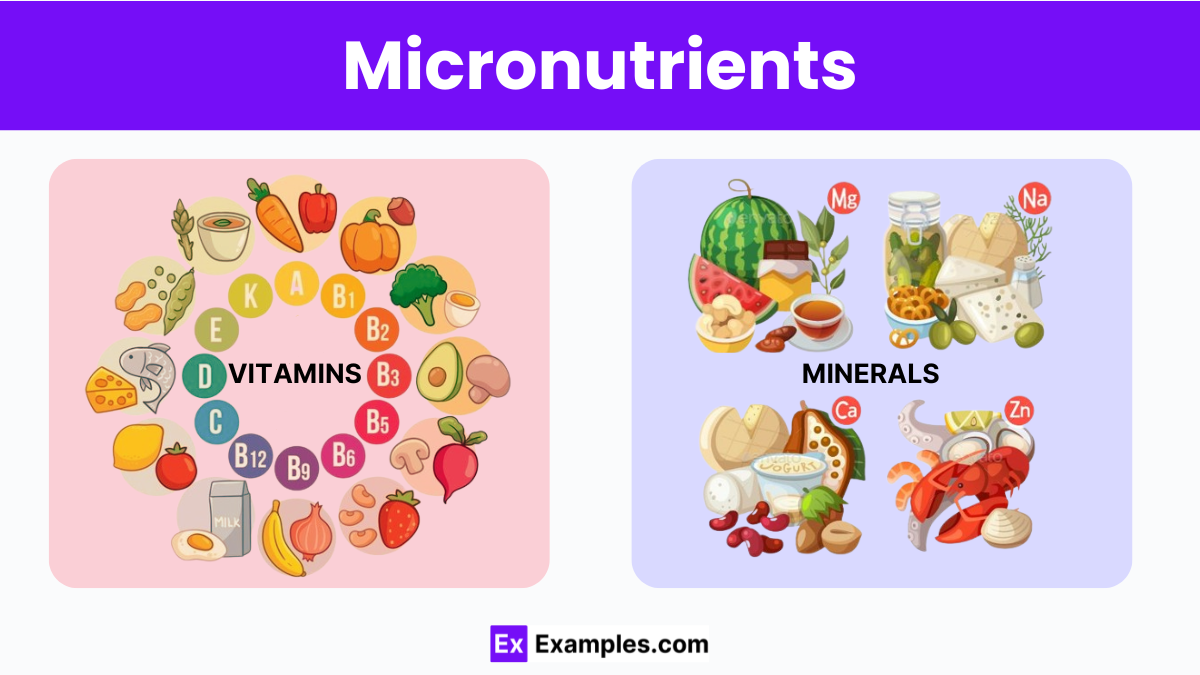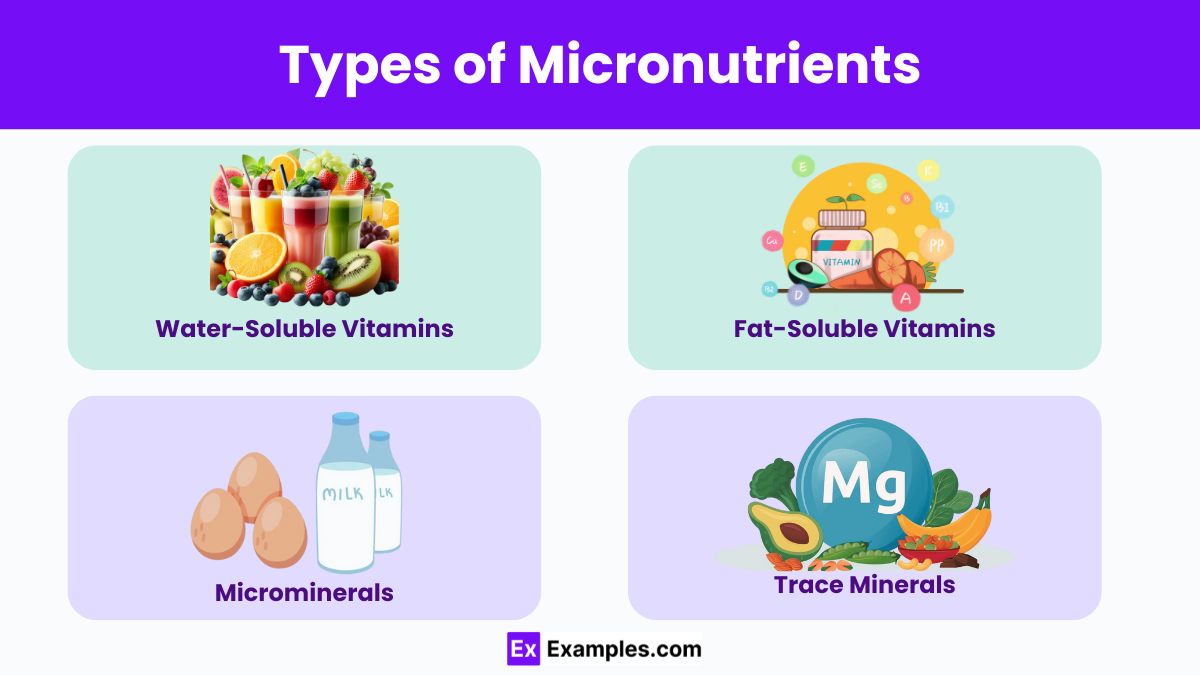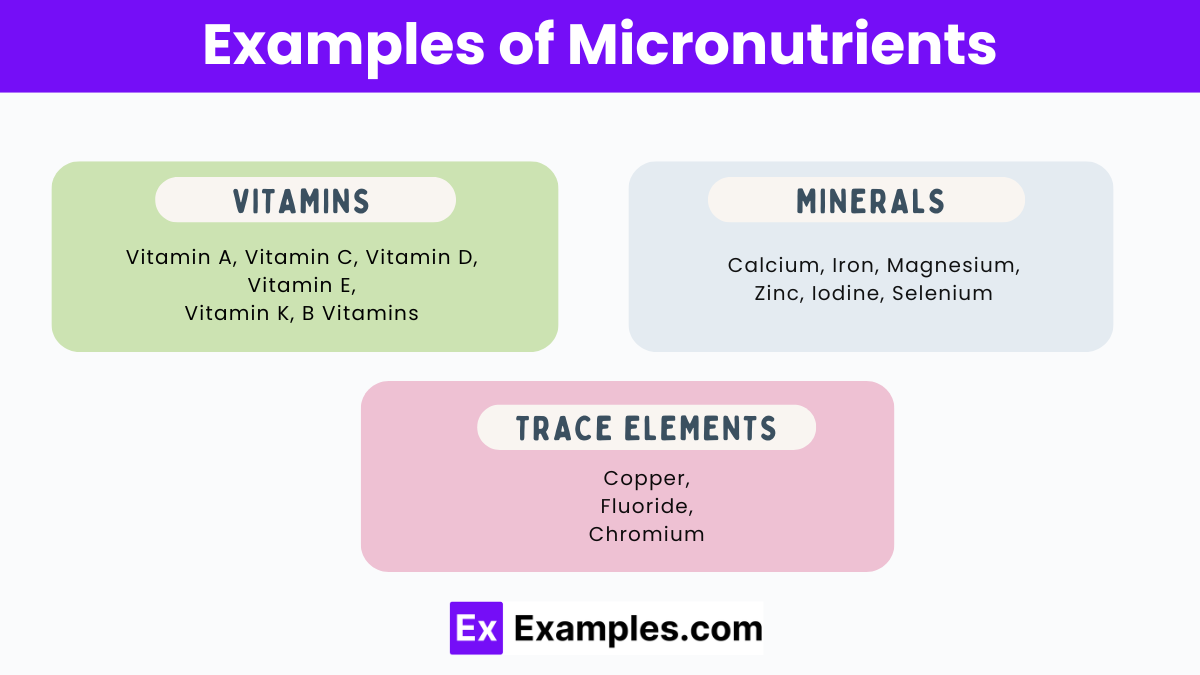What are micronutrients primarily required for in the human diet?
Providing energy
Supporting growth and development
Regulating body temperature
Building muscle mass


Micronutrients are essential vitamins and minerals that play pivotal roles in maintaining health and preventing diseases. Unlike macronutrients, such as carbohydrates, fats, and proteins, which are required in larger quantities, micronutrients are needed in minute amounts. Despite their small required intake, their impact on health is profound. Adequate consumption of these nutrients is crucial for enzyme, hormone, and antibody production, as well as overall development and well-being. Micronutrient deficiencies can lead to severe health issues, including growth retardation, weakened immune response, and neurological impairments, particularly in children and pregnant women.
Micronutrients are a group of nutrients comprised of vitamins and minerals that are vital for optimal body function and health. They are only required in small quantities by the body but are crucial for disease prevention, growth, and good health. Unlike some vitamins such as vitamin D, the body cannot produce most micronutrients, so they must be obtained from a balanced diet, fortified foods, or supplements. Each micronutrient supports specific functions; for example, vitamins aid in energy production and immune function, while minerals are fundamental for bone health, fluid balance, and neurological processes. Micronutrient deficiencies are a global health concern that can lead to various physical and mental health challenges, underscoring the importance of a well-rounded diet enriched with essential vitamins and minerals.

Water-soluble vitamins, including the B-complex vitamins and vitamin C, play a pivotal role in maintaining health. These nutrients dissolve in water and are not stored in the body, necessitating a daily intake to ensure a constant supply. The primary functions of water-soluble vitamins include energy production and bolstering cellular functions, particularly of red blood cells. Excess amounts of these vitamins are excreted through urine, emphasizing the need for regular consumption to avoid deficiencies.
Fat-soluble vitamins, which include vitamins A, D, E, and K, dissolve in fats and oils and are stored in the body’s fatty tissues and liver. These vitamins are crucial for a myriad of functions, such as maintaining good vision, supporting the immune system, and facilitating the healing of wounds. Due to their solubility in fats, they can accumulate within the body, making it important to manage their intake carefully.
Microminerals such as calcium, magnesium, sodium, and potassium are essential for robust health, particularly in bone and muscle function. They play critical roles in regulating blood pressure and supporting the structural integrity of bones and teeth. Regular intake of these microminerals is necessary to maintain their adequate levels in the body, supporting overall physiological functions.
Trace minerals, including iron, manganese, copper, zinc, and selenium, are required in smaller amounts but are equally vital. These nutrients are integral to muscle function, nervous system health, and cellular repair. Trace minerals aid in a variety of body processes, from oxygen transport to antioxidant defense, and must be consumed in appropriate amounts to support these essential functions.
Micronutrients, consisting of vitamins and minerals, are crucial for a wide array of biological functions and maintaining overall health. Here’s a detailed look at their key roles:
Many micronutrients, particularly B vitamins such as thiamine, riboflavin, niacin, and pantothenic acid, play critical roles in energy metabolism. They act as coenzymes that help the body convert carbohydrates, fats, and proteins into energy, thus supporting the metabolic processes essential for daily activity and vitality.
Micronutrients like vitamins A, C, D, and the minerals zinc, selenium, and iron, are fundamental in supporting the immune system. Vitamin D, for instance, modulates the immune responses, while zinc is crucial for the normal development and function of cells mediating innate immunity. Vitamin C enhances white blood cell function and integrity, which is vital for fighting infections.
Calcium, vitamin D, and magnesium are central to bone health. Calcium and phosphorus are critical in bone structure, vitamin D helps absorb calcium, and magnesium plays a role in the bone remodeling process. Adequate intake of these micronutrients is essential for developing and maintaining peak bone mass.
Iron, vitamin B12, and folic acid are key players in the production of red blood cells and hemoglobin. Iron is a part of hemoglobin, enabling oxygen transport from the lungs to other parts of the body. Vitamin B12 and folic acid are necessary for the synthesis of nucleic acids and the maturation of red blood cells in the bone marrow.
B vitamins are vital for a healthy nervous system. For example, vitamin B12 maintains the health of nerve cells and helps in the formation of the nerve cell’s protective cover, the myelin sheath, which is essential for the proper transmission of nerve impulses.
Micronutrients such as vitamins C and E, and the mineral selenium, function as antioxidants. They help combat oxidative stress by neutralizing free radicals, which are unstable molecules that can damage cells and are linked to chronic diseases and aging.
Potassium and magnesium play a role in blood pressure regulation. Potassium lessens the effects of sodium and helps relax blood vessel walls, while magnesium helps regulate blood pressure. Micronutrients like niacin and folic acid also support cardiovascular health by aiding in fat metabolism and reducing homocysteine levels, which is a risk factor for heart disease.
Micronutrients are essential for the production and function of hormones in the body. For example, iodine is crucial for the synthesis of thyroid hormones, which regulate metabolism, energy production, and body temperature.

Micronutrients include a wide array of vitamins and minerals, each playing a unique role in maintaining health and supporting body functions. Here’s a breakdown of some key micronutrients and their primary functions:
Micronutrients, including essential vitamins and minerals, play a crucial role in overall health and disease prevention. Despite their necessity in only small amounts, they significantly impact bodily functions such as enzyme production, hormone regulation, and immune responses. Moreover, micronutrients support developmental processes, enhance mental clarity, and boost energy levels. Consequently, even minor deficiencies can lead to serious health issues, particularly affecting vulnerable populations like children and pregnant women. Therefore, maintaining a balanced diet rich in these nutrients is key to sustaining health and enhancing life quality.
Micronutrients, which include a variety of vitamins and minerals, are essential components of a healthy diet and play key roles in maintaining bodily functions and preventing diseases. Here’s a comprehensive overview of the numerous health benefits provided by these vital nutrients:
Micronutrients such as vitamin A, vitamin D, calcium, and zinc are critical during the growth and developmental stages of life, particularly in children and adolescents. They support the proper development of bones, muscles, and organs and are vital for neurological development and the overall growth process.
Adequate intake of certain micronutrients boosts the immune system’s ability to fight against infections. For instance, vitamins A, C, and D, as well as minerals like zinc and selenium, enhance immune responses and protect against illnesses and infections by enhancing the barrier function of skin, the production of antibodies, and cell-mediated immunity.
Micronutrients have significant roles in the prevention and management of chronic diseases such as heart disease, diabetes, and cancer. Antioxidant vitamins like vitamins C and E, as well as minerals like selenium, help in reducing oxidative stress and inflammation, factors that are linked to chronic disease development.
B vitamins (including folate, B6, and B12) are essential for a healthy brain function. They help in the synthesis of neurotransmitters and reduce the risk of mental health disorders, including depression and age-related cognitive decline. Micronutrients also support the maintenance of cognitive functions and can help in preventing dementia and Alzheimer’s disease.
Micronutrients play critical roles in pregnancy for both maternal and fetal health. Folic acid is renowned for reducing the risk of neural tube defects in newborns. Other nutrients like iron, iodine, and calcium are crucial for preventing maternal complications and ensuring the healthy development of the fetus.
Micronutrients such as iron, magnesium, and the B vitamins are integral in energy production and metabolism. They help convert food into energy, enabling proper metabolic functions and providing the body with the necessary energy to perform daily activities efficiently.
Vitamins A, C, and E, as well as zinc, contribute to the health and maintenance of skin. They assist in the regeneration of skin cells, protect against UV radiation, and combat the visible signs of aging. Adequate micronutrient intake can result in clearer, more resilient skin.
Vitamins and minerals such as vitamin C, zinc, and copper are essential for the repair and regeneration of tissues. They play key roles in collagen formation and wound healing, supporting the body’s ability to repair itself after injury.
Micronutrients, including essential vitamins and minerals, play a crucial role in overall health and disease prevention. Despite their necessity in only small amounts, they significantly impact bodily functions such as enzyme production, hormone regulation, and immune responses. Moreover, micronutrients support developmental processes, enhance mental clarity, and boost energy levels. Consequently, even minor deficiencies can lead to serious health issues, particularly affecting vulnerable populations like children and pregnant women. Therefore, maintaining a balanced diet rich in these nutrients is key to sustaining health and enhancing life quality.
Micronutrients play crucial roles in the growth and health of plants, each serving specific functions. For example, iron catalyzes the formation of chlorophyll and is essential for photosynthesis. Meanwhile, manganese aids in the enzyme system’s operations, particularly in nitrogen assimilation and the breakdown of carbohydrates. Additionally, zinc influences growth hormones and enhances stem growth, while copper activates enzymes and impacts photosynthetic and respiratory processes. Furthermore, boron is vital for the regulation of carbohydrate usage and is necessary for the growth of plant tissues. Similarly, molybdenum participates in the conversion of nitrates into amino acids within the plant, enhancing protein synthesis. Therefore, these micronutrients, though required in small quantities, are indispensable for optimal plant development, reproduction, and overall health, underscoring the necessity for balanced soil nutrition to support diverse plant life.
Micronutrients, essential vitamins and minerals, play critical roles in maintaining health and preventing diseases. They support various bodily functions such as immune defense, hormone regulation, and cellular repair. Despite needing them in small amounts, failing to get enough of these nutrients can lead to significant health issues, including impaired growth, neurological problems, and weakened immunity. Therefore, it’s vital to include a diverse range of foods in your diet to ensure adequate intake of these key nutrients.
Micronutrients are essential vitamins and minerals that the human body requires in small amounts for optimal health. These include vitamins like Vitamin C, Vitamin D, and Vitamin B12, as well as minerals such as iron, zinc, and iodine. Foods rich in micronutrients are crucial for supporting immune function, energy production, and overall cellular health. Fruits and vegetables are powerhouse sources of vitamins, while nuts, seeds, and whole grains provide essential minerals. Lean meats, fish, and dairy products are excellent for a combined intake of various micronutrients. Incorporating a diverse range of these foods into your diet ensures a good balance of these vital nutrients.
Micronutrients deficiency, often referred to as hidden hunger, is a prevalent health issue where the body lacks essential vitamins and minerals required for proper growth, development, and overall health. This condition can lead to serious health problems, including impaired immune function, skin disorders, mental health issues, and developmental delays in children. Common deficiencies include lack of iron, vitamin A, iodine, and zinc. Addressing micronutrient deficiencies is critical for improving global health, particularly in developing countries where access to a diverse and nutritious diet may be limited.
Micronutrients, vital for various bodily functions, are found abundantly in common foods. Vitamins such as C, found in citrus fruits and spinach, aid in tissue repair and iron absorption, while vitamin D, from sources like salmon and sunlight, enhances bone health by facilitating calcium and phosphorus absorption. Additionally, vitamin E, present in nuts and broccoli, serves as an antioxidant, protecting cells from damage. Vitamin K, essential for blood clotting, is plentiful in leafy greens and vegetable oils. The B vitamins, sourced from whole grains and meats, are crucial for energy production and red blood cell formation. On the mineral front, iron from red meat and beans is key for oxygen transport, calcium from dairy and greens strengthens bones, and potassium, found in bananas and tomatoes, supports fluid balance and nerve signals. Magnesium and zinc, necessary for muscle function and immune health, can be obtained from nuts, seeds, and legumes. These micronutrients collectively support health by contributing to immune function, bone health, and more.
The seven essential micronutrients include iron, manganese, copper, zinc, molybdenum, boron, and chlorine, crucial for human and plant health.
The three main micronutrients are iron, zinc, and copper, vital for metabolic processes, enzyme functions, and immune health.
Examples of micronutrients include vitamins such as B12 and D, and minerals like iron, zinc, and selenium, all essential for bodily functions.
The big four micronutrients are iron, zinc, copper, and selenium, key to immune function, growth, and overall health maintenance.
The top five micronutrients are iron, zinc, iodine, copper, and vitamin A, crucial for growth, development, and disease prevention.
Text prompt
Add Tone
10 Examples of Public speaking
20 Examples of Gas lighting
What are micronutrients primarily required for in the human diet?
Providing energy
Supporting growth and development
Regulating body temperature
Building muscle mass
Which vitamin is crucial for maintaining healthy vision?
Vitamin A
Vitamin C
Vitamin D
Vitamin E
Which mineral is important for the formation of hemoglobin in red blood cells?
Calcium
Iron
Zinc
Magnesium
What role does iodine play in the body?
Enhancing bone density
Supporting thyroid function
Strengthening the immune system
Regulating blood pressure
Which vitamin is known for its antioxidant properties?
Vitamin K
Vitamin D
Vitamin C
Vitamin B12
Which mineral is important for maintaining healthy bones and teeth?
Sodium
Phosphorus
Potassium
Iron
Which vitamin is essential for blood clotting?
Vitamin A
Vitamin K
Vitamin E
Vitamin B6
Which micronutrient is known for its role in wound healing and immune function?
Zinc
Copper
Selenium
Magnesium
Which of the following is a source of vitamin D?
Citrus fruits
Leafy green vegetables
Fatty fish
Whole grains
Which mineral helps in regulating fluid balance and nerve function in the body?
Calcium
Sodium
Iron
Zinc
Before you leave, take our quick quiz to enhance your learning!

